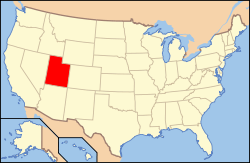Ophir, Utah
| Ophir, Utah | |
|---|---|
| Town | |
|
Ophir in winter | |
 Location in Tooele County and the state of Utah | |
 Location of Utah in the United States | |
| Coordinates: 40°22′9″N 112°15′31″W / 40.36917°N 112.25861°WCoordinates: 40°22′9″N 112°15′31″W / 40.36917°N 112.25861°W | |
| Country | United States |
| State | Utah |
| County | Tooele |
| Named for | Ophir |
| Area | |
| • Total | 0.2 sq mi (0.4 km2) |
| • Land | 0.2 sq mi (0.4 km2) |
| • Water | 0.0 sq mi (0.0 km2) |
| Elevation | 6,496 ft (1,980 m) |
| Population (2012) | |
| • Total | 40 |
| • Density | 143.0/sq mi (55.2/km2) |
| Time zone | Mountain (MST) (UTC-7) |
| • Summer (DST) | MDT (UTC-6) |
| ZIP code | 84071 |
| Area code(s) | 435 |
| FIPS code | 49-56750[1] |
| GNIS feature ID | 1431015[2] |
Ophir is a town in Tooele County, Utah, United States. It is part of the Salt Lake City, Utah Metropolitan Statistical Area. The population was 23 at the 2000 census, a decrease of two from the 1990 figure of 25.
History
Ophir was named for the nearby canyon and mining district, where gold was discovered in the 1860s. The mining district was named for the biblical Ophir, from where King Solomon brought back gold to Israel.[3]
Geography
According to the United States Census Bureau, the town has a total area of 0.2 square miles (0.4 km²), all of it land.
Demographics
| Historical population | |||
|---|---|---|---|
| Census | Pop. | %± | |
| 1890 | 249 | — | |
| 1900 | 295 | 18.5% | |
| 1910 | 283 | −4.1% | |
| 1920 | 522 | 84.5% | |
| 1930 | 170 | −67.4% | |
| 1940 | 300 | 76.5% | |
| 1950 | 199 | −33.7% | |
| 1960 | 36 | −81.9% | |
| 1970 | 76 | 111.1% | |
| 1980 | 42 | −44.7% | |
| 1990 | 25 | −40.5% | |
| 2000 | 23 | −8.0% | |
| 2010 | 38 | 65.2% | |
| Est. 2015 | 54 | [4] | 42.1% |
[6] As of the census[1] of 2000, there were 23 people, 10 households, and 6 families residing in the town. The population density was 143.0 people per square mile (55.5/km²). There were 33 housing units at an average density of 205.1 per square mile (79.6/km²). The racial makeup of the town was 95.65% White and 4.35% Asian.
There were 10 households out of which 20.0% had children under the age of 18 living with them, 60.0% were married couples living together, and 40.0% were non-families. 40.0% of all households were made up of individuals and 20.0% had someone living alone who was 65 years of age or older. The average household size was 2.30 and the average family size was 3.17.
In the town the population was spread out with 8.7% under the age of 18, 8.7% from 18 to 24, 8.7% from 25 to 44, 43.5% from 45 to 64, and 30.4% who were 65 years of age or older. The median age was 54 years. For every 100 females there were 109.1 males. For every 100 females age 18 and over, there were 110.0 males.
The median income for a household in the town was $50,000, and the median income for a family was $49,167. Males had a median income of $46,875 versus $13,750 for females. The per capita income for the town was $29,906. None of the population or families were below the poverty line.
References
- 1 2 "American FactFinder". United States Census Bureau. Retrieved 2008-01-31.
- ↑ "US Board on Geographic Names". United States Geological Survey. 2007-10-25. Retrieved 2008-01-31.
- ↑ Van Atta, Dale (Jan 22, 1977). "You name it - there's a town for it". The Deseret News. pp. W6. Retrieved 18 October 2015.
- ↑ "Annual Estimates of the Resident Population for Incorporated Places: April 1, 2010 to July 1, 2015". Retrieved July 2, 2016.
- ↑ "Census of Population and Housing". Census.gov. Retrieved June 4, 2015.
- ↑ http://factfinder2.census.gov/faces/nav/jsf/pages/community_facts.xhtml
 |
Stockton | Tooele | Copperton Herriman |
 |
| Rush Valley | |
Cedar Fort | ||
| ||||
| | ||||
| Vernon | Fairfield |

